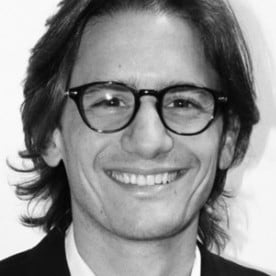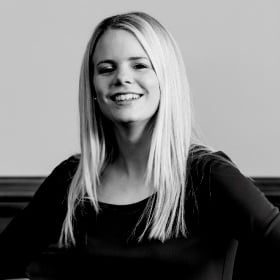‘Experience is a comb you earn after losing your hair’ – that was the answer I received from a former triathlon coach when asked if, after so many kilometres, he was able to find shortcuts in a race. He then explained that it is extremely important to build your foundations, which takes time, but occasionally less experienced competitors have an edge because they have not been regimented in conventional ways of training and competing.
The same, I believe, is true for business and leadership in particular. Just knowing your stuff is no longer a competitive advantage when it comes to leading projects, people and companies, put against the availability of algorithmic thinking and ubiquitous knowledge.
Know-how, expertise and the ruling of competencies are, like so many other things, also commoditising. Even our once unique, individual journeys to mastery have been transformed into something as simple (yet not as easy) as a cake recipe. That’s the central idea in Malcolm Gladwell’s book Outliers: The Story of Success, which proposes that practising anything for 10,000 hours can lead to outstanding technical skill and, eventually, success.
However, success factors are a lot more varied and even popular culture has proved the expertise advantage insufficient. TV showsRedesign My Brain, Man V. Expert and Faking It demonstrate that expertise doesn’t have to be the fruit of strenuous journeys. In fact, non-experts are able to quickly acquire specific skills and perform to the same high standards as their experienced counterparts when put to the test.
The highly informative and entertaining documentary The Trouble with Experts validates the idea that the more certain their pronouncements, the more likely experts are to be wrong. It also shows how trust, another leadership quality, is often built on superfi cial signals of confidence, such as height, voice and adorning yourself with some bling.
If that’s not enough, Philip Tetlock, an American professor from the University of Pennsylvania and author of Superforecasting: the art and science of prediction, has been gathering evidence for the last 20 years proving that the average ‘expert’ is about as good at predicting what the future holds as a dart-throwing chimp is at hitting the bullseye!
In the context of the knowledge-intense marketing and communications industry, we have traditionally sold our value through branded frameworks, patented tools and trademarked services, which over a pitch context may cause a positive impact, but in the everyday dealings of business and co-creation will just confuse and most likely detract value from the knowledge being imparted.
Advice is our currency and, instead of imposing or coming up with new and fancier frameworks, service-based businesses (agencies especially) could use their ‘experts’ as variables of a broader trust equation as described in The Trusted Advisor by David Master.
Based on the equation, expertise is the constant and the way it is applied its variables. Therefore, openness to problem solving has replaced expertise as a competitive advantage. But, to be ahead of the curve and assert leadership, courage to venture in the unknown and write the future as it happens is what will eventually separate managers from leaders.
Managers’ ‘trusted pair of hands’ are in parity with automation, while a leader’s audacious pair of hands are able to make algorithms eat dust when doing the programmatically unexpected. Perth-based content marketing agency Lush Digital hosts its own series of podcasts and the episode ‘Building Authority versus Being an Expert’ makes a really good point when saying that authority is about having a vision of the future, an area where specific expertise cannot be verified until after the fact.
The above is also the dominant thinking among venture capitalists backing the start-ups with the potential to lead new markets. For example, Indian-American innovator and billionaire philanthropist, Manoj Bhargava frequently says, “whenever someone claims being an expert I lose interest. That is because experts are those who know about the past and my interest is in transforming the future.”
Established expertise has little application in the large-scale commercialisation of radically innovative, patentable technologies.
When James Joyce coined the term ‘work in progress’ it was because he knew its purpose was not to complete it, but to learn from it. Scholarship is, in this sense, most valuable insofar as it helps one build and evolve leadership skills.
For those in leadership positions, however, it is not enough to just create and sell a vision to people and expect they will then feel inspired to execute it.
Instead, fostering willingness to innovate is what lies in the crux of future-proofing your strategy. And for that to happen, one needs to accept the paradoxes of managing an innovative culture, where structure and improvisation make up for constant tensions.

A good leadership journey can be like a sequence of bad hair days. Using the tensions illustrated above in this metaphor, there is no clear-cut answer as to whether it’s better to brush to the left or to the right.
Too many left strokes may limit opportunities to solve problems and reinvent the future, while excessive strokes to the right will blur the focus and open the way for conflict and chaos. If you feel like your leadership style may be leaning to one way more than the other, this will typically lead to issues in your team. Take our free 60 second self-assessment and find out whether your team suffers from any of the five dysfunctions of a team.
There’s not one ideal configuration of competencies able to predict one’s ability to lead. Flexibility, however, can greatly contribute to harnessing solutions against the most pressing challenges and times.
Paraphrasing my triathlon coach, do not over-rely on your experience and expertise; they are mirrors of what was and a foggy version of what is. Replace your comb with your fingers and your mirror with the glass window; this will not only let you reinvent your style, but also replace a self-oriented perspective with one that is constantly considering what lies ahead.





